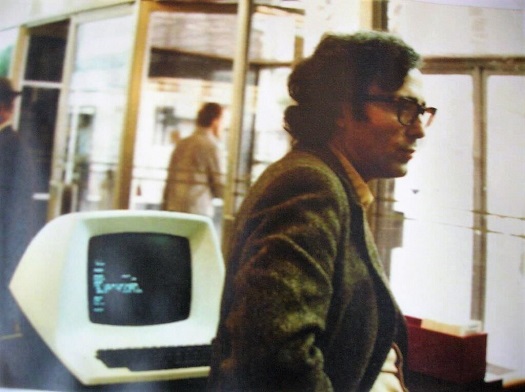Like many of my colleagues, I was deeply saddened to learn of Brian Campbell’s death in December. In thinking about his many contributions to our profession and society, a constant thought was the disbelief that such a vital and energetic individual is no longer out there agitating, mobilizing, and mentoring.
I first became aware of Brian during Vancouver’s municipal election in 1974, when he was the Civic NDP’s mayoralty candidate. The campaign remains one of the most revisited in the City’s history—not because of Brian’s candidacy for the Civic NDP or Mayor Art Phillip’s re-election, but rather because it featured an independent candidate: performance artist Vincent Trasov, in the guise of Mr. Peanut, with his retinue of dancing Peanettes. That campaign surfaces periodically in grainy videotape documentation shown at the Vancouver Art Gallery (VAG), and you would always get a resigned grimace from Brian when you told him that you had seen him at the VAG. Let’s just say he wasn’t amused by the subversion of serious political debate by performance art.

Brian Campbell in the 1980s. Photo provided by Vancouver Public Library.
It wasn’t until the 1980s that I got to know Brian, following his graduation from library school and his employment by Vancouver Public Library to oversee the implementation of their first automated circulation system. He had entered library school at an older age than most of the other students, and in the words of one of his professors: “He arrived fully formed.” Brian’s oversight of VPL’s computer systems was guided by his foundational beliefs in equity of access, the importance of public service, and the independence of the library in controlling its IT infrastructure.
These values were reflected in partnerships between VPL and community initiatives such as Vancouver FreeNet, where he played an important leadership role. It is highly unlikely that collaborations such as providing server space to FreeNet would have been possible without Brian’s interventions. This history of supporting such initiatives is still reflected in VPL’s positive reception in the community. On another IT note, it was Brian who fought to have the VPL computer room on an upper floor in the (then-new) Central Library. The importance of this positioning came home to me with the sprinkler flood in the branch last fall. The fallout from this incident could have been far more serious if the computer room had been on the lower level.
Our initial connections were through working on various BCLA and CLA committees and collaborating on conference programming. Brian’s work on raising awareness of the Multilateral Agreement on Investment (MAI) in the mid-1990s had international implications as the debate migrated to the WTO treaties. By the late 1990s I was on the IFLA Copyright and other Legal Matters Committee, and with Brian’s support we were able to secure funding from IFLA (and others). Two major studies were commissioned from Canadian experts on the implications for libraries with international agreements on public sector services including libraries. We were together in Seattle during the WTO “Battle in Seattle,” with Brian representing CLA and me IFLA. The NGO accreditation we had afforded us a level of access to negotiators which today would be inconceivable.
As well as being partially inside, we were on the streets as well, where Brian’s connections and instincts paid significant dividends while my better knowledge of downtown Seattle streets helped keep us out of trouble. I note that the only time I have smelled tear gas was in Brian’s company.
In hindsight I believe that Brian’s information policy work—with his emphasis on coalition building outside the profession—was his greatest contribution to libraries. His presence is reflected in the policy work that BCLA continues to this day. This is not to downplay his role in other areas, which included championing intellectual freedom, but with information policy he really was the instigator.
Brian and I worked closely together at VPL from 2003 to his retirement. I believe his greatest achievement in this period was his leadership with the pan Canadian Working Together Project. He provided the vision for developing inclusive, user-directed library services and played the central role in securing federal funding. The Project’s mission statement says it best: “The library should be an expression of its community’s vision and creativity; this can only happen if we involve them actively in decision-making and planning.”
Brian was a powerful presence and his personality was multi-faceted. He had a deep love for his family and displayed empathy with others on numerous occasions. He engendered deep loyalty in many of his colleagues and feuded with a few. He was exacting and had a reputation as a “task master,” but he only expected from others what he himself was prepared to give. The VPL management support group members told a joke at his retirement party which he found funny: “We were going to invite Brian’s former assistants to the party, but BC Place Stadium wasn’t available.” This reminds me of his sense of humour and his great laugh. He was a dedicated bicycle commuter long before bike lanes; just one example of his demonstrating his commitment to his beliefs in tangible ways. Whatever his accomplishments, from his perspective it was never about him but rather it was about the next injustice to battle.
Brian was unique, but his focus on mentoring and establishing advocacy, partnership, and policy frameworks ensured that his influence endures. In our corner of the world he was librarianship’s social conscience. His ideas and vision continue.
Paul Whitney worked in BC public libraries for 36 years, including serving as Chief Librarian with Burnaby Public and Vancouver Public libraries.
Project Coordinator, BCLA

